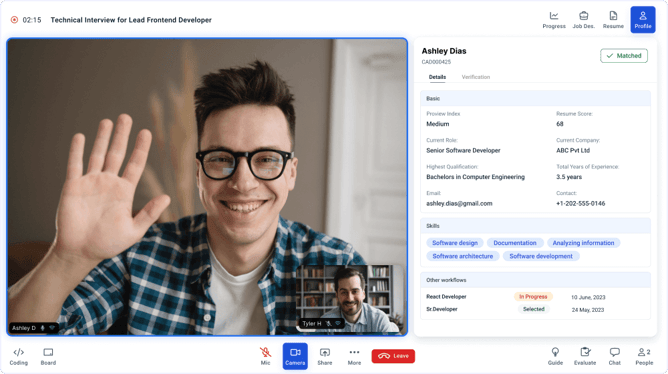Campus Recruitment has always been an important part of the hiring process for many organizations. It is a great way to build a talent pipeline and identify promising candidates early in their careers. However, the COVID-19 pandemic has disrupted traditional campus recruiting practices and accelerated the adoption of new technologies and strategies.
The job market is constantly evolving, and campus recruiting is no exception. With the rise of new technologies and changing candidate preferences, campus recruiting has undergone a significant transformation in recent years. In order to stay ahead of the competition and attract top talent, organizations must stay up to date with the latest campus Recruitment trends.
In this blog, we will explore the top 7 campus Recruitment trends to watch out for.
Why Campus Recruitment Matters for Organizations
-
Access to Talent & Building a Future Pipeline: Campus recruitment provides access to fresh talent and allows organizations to cultivate a pipeline of potential future hires.
-
Employer Branding: Active participation in campus recruitment enhances employer branding, showcasing the organization as an attractive place to work.
-
Cost Effectiveness: Targeting students and recent graduates offers a cost-effective way to identify and onboard talent.
-
Cultural Fit: Campus recruitment enables organizations to assess candidates for cultural alignment, fostering a cohesive work environment.
-
Innovation and Diversity: Diverse campus recruitment drives innovation by bringing in varied perspectives and experiences.
-
Long-Term Succession Planning: Early talent identification supports long-term succession planning and leadership development strategies.
Re-defining Recruitment Strategies: 7 Trends in Campus Recruitment
1. Emphasizing Diversity, Equity, and Inclusion (DEI)
Diversity, equity, and inclusion (DEI) have become a top priority for many organizations, and campus recruiting is no exception. To attract and retain top talent, organizations must create a culture of inclusivity and belonging.
To Adapt to DEI in campus Recruitment processes, organizations can implement strategies such as:
Interview Insights that monitor for bias and interviewer conformance to achieve Diversity, Equity and Inclusion (DEI) goals.
- Utilize AI-generated insights to monitor bias and ensure fair assessment, aiding in meeting (DEI) goals.
- Coach interviewers for fair, unbiased, and compliant interviews, enhancing campus recruitment practices.
- Provide consistent feedback to elevate candidate experience and skill enhancement, improving campus recruitment outcomes.
2. Virtual Campus Recruiting
The pandemic has made virtual campus recruiting a necessity for many organizations. Even as in-person events begin to resume, virtual recruiting will likely remain an important part of the campus recruitment landscape. It offers several benefits, including:
- Increased efficiency and cost savings
- Expanded reach to a wider pool of candidates.
- Reduced environmental impact.
- Improved candidate experience
3. Skills-Based Hiring
Skills-based hiring is becoming increasingly important in campus recruiting. Rather than focusing solely on academic performance, organizations are placing more emphasis on candidates' Technical & Soft skills.
Organizations leverage tools such as skill-based assessments, behavioral interviewing, linguistic Based assessments and other simulations. These tools can help organizations identify candidates who have the right mix of technical, behavioral & soft skills for the job.
4. Employer Branding
Employer branding is the process of promoting an organization as an employer of choice. In campus recruiting, employer branding is essential for attracting and retaining top talent. Organizations with a strong employer brand are more likely to attract the right candidates and retain top performers.
To build an effective employer brand in campus recruiting, organizations must focus on:
- Understanding the target audience and their values
- Highlighting the organization's unique culture and values
- Using a multi-channel approach to reach candidates where they are
- Providing a positive candidate experience
5. Artificial Intelligence (AI) in Recruitment
Artificial intelligence (AI) is becoming an increasingly popular tool in campus recruiting. AI can be used to automate repetitive tasks, such as resume screening, and improve the quality of the candidate pool by reducing bias in the hiring process.
Some ways that AI can be used in campus recruiting include:
- Simplifying bulk scheduling process with Interview Scheduling Software
- AI-Powered Assessments & On-Demand Video Interviewing for efficient Candidate shortlisting.
- Identify the Right Talent with Candidate Intelligence.
AI Recruitment tools enables organizations save time and improve the quality of their hiring decisions. However, it is important to leverage AI ethically and ensure that it is not perpetuating biases or discriminatory practices.

6. Personalization
Personalization is key to providing a positive candidate experience in campus recruiting. Candidates want to feel like they are more than just a number, and that the organization values them as individuals. To personalize the campus recruiting experience, organizations can:
- Use candidate data to personalize communication and outreach.
- Provide tailored content and resources based on candidate interests.
- Offer personalized feedback and follow-up after interviews & events.
Personalization can help organizations stand out from the competition and build a strong talent pipeline.
7. Virtual Reality (VR)
Virtual reality (VR) is a cutting-edge technology that is becoming increasingly popular in campus recruiting. VR can be used to give candidates a realistic and immersive experience of the organization and its culture. This can help candidates feel more engaged and connected to the organization.
Some ways that organizations are using VR in campus recruiting include:
- Virtual tours of the organization and its facilities
- Virtual reality job previews and work simulations
- VR-based assessments and training
Streamlining Campus Recruitment with Talview
Talview's AI-Powered Recruitment platform offers cutting-edge solutions to streamline campus recruitment processes, enabling organizations to stay ahead in the competitive talent landscape. Here's how Talview can enhance your campus recruitment efforts:
- Virtual Campus Recruiting: Conduct virtual campus drive to screen, assess, and identify graduates from multiple campuses at once.
- AI-powered Assessments & Interviewing: Utilize Talview's AI-powered platform to conduct assessments & Video interviews. With AI-driven insights, organizations can streamline the screening process, reduce bias, and focus on engaging with the most qualified candidates.
- Diversity and Inclusion: Ensure Diversity, Equity, and Inclusion (DEI) goals with AI-generated Interview insights and interviewer coaching.
Conclusion
Campus Recruitment is changing rapidly, and organizations that want to succeed in this space must adapt to the latest trends and technologies. By emphasizing diversity, virtual recruiting, skills-based hiring, gamification, employer branding, AI, soft skills assessment, personalization, VR, and data-driven decision making, organizations can attract and retain top talent and build a strong talent pipeline for the future.
Ready to redefine your campus recruitment strategy? Contact Talview today for expert insights & innovative solutions tailored to your organization's needs.







Leave a Reply